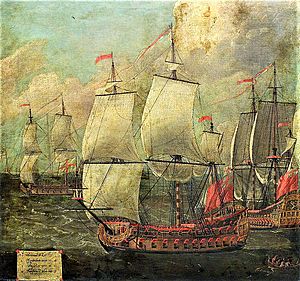HMS Assurance (1646) facts for kids

|
|
Quick facts for kids History |
|
|---|---|
| Name | HMS Assurance |
| Builder | Peter Pett I, Deptford |
| Launched | 1646 |
| Commissioned | 1646 |
| Honours and awards |
|
| Fate | Sold, 1698 |
| General characteristics | |
| Class and type | 32-gun fourth-rate frigate |
| Tons burthen | 340+81⁄94 bm |
| Length |
|
| Beam | 26 ft 10 in (8.18 m) |
| Depth of hold | 13 ft 6 in (4.11 m) |
| Sail plan | ship-rigged |
| Complement | 190/160/120 by 1666 |
| Armament |
|
HMS Assurance was a warship from England, launched in 1646. She was a "fourth-rate" ship, meaning she was a medium-sized warship with 32 guns. She was built by Peter Pett I at Deptford Dockyard.
Assurance first served with the Parliament's forces during the English Civil War. After the war, she joined the Commonwealth Navy. When the king returned to power in 1660, she became part of the Royal Navy. She fought in many important battles, including Dover, Portland, Gabbard, and Texel. In 1660, she sank during a storm but was later pulled out of the water. She continued to serve until 1698, when she was sold.
Contents
Building and Features
HMS Assurance was ordered in December 1645. She was built at Deptford Dockyard and launched in 1646. She was about 32.5 meters (106 feet 7 inches) long on her main gun deck. Her widest part was about 8.1 meters (26 feet 10 inches).
When she was first launched, Assurance had 32 guns. Over time, the number and types of her guns changed. By 1666, she carried 38 guns, including larger "culverins" and smaller "demi-culverins." By 1685, she had 42 guns. Building her cost about £2,352, which was a lot of money back then!
Ship's Service History
Serving in the English Civil War
HMS Assurance started her service in 1646. She was commanded by Captain William Penn. She sailed with the Parliament's navy, especially in the Irish Sea, from 1647 to 1649.
In 1650, Captain Benjamin Blake commanded Assurance. She joined Robert Blake's fleet and even captured a Portuguese warship. She fought in several key battles during the First Anglo-Dutch War.
At the Battle of Dover on May 19, 1652, she was part of a squadron of nine ships. She also fought in the Battle of Kentish Knock in September 1652. In February 1653, she took part in the Battle of Portland, a big British victory that helped control the English Channel.
Later in 1653, Captain Philip Holland took command. Assurance fought in the Battle of the Gabbard and the Battle of Scheveningen. These were important naval battles against the Dutch.
In December 1660, a storm caused Assurance to sink near Woolwich. About 20 crew members were lost. Famous diarist Samuel Pepys wrote about visiting the site. Luckily, the ship was pulled from the water a few days later.
Serving After the Restoration (1661)
After the king was restored to the throne in 1660, Assurance continued her service. In 1661, she sailed to Tangiers and Algiers.
She fought in the Second Anglo-Dutch War. On June 3, 1665, she was part of the Battle of Lowestoffe. She also took part in the long Four Days' Battle in June 1666. Later that year, she was at the Battle of Oxfordness.
In 1667, Assurance sailed to the West Indies. She was involved in action near Martinique before returning home.
She continued to serve in various roles, including protecting convoys and sailing in the English Channel. In 1690, she was reclassified as a "Fifth Rate" ship, meaning she was a slightly smaller type of warship.
What Happened to Her
HMS Assurance was sold in 1698, ending her long career.
 | Dorothy Vaughan |
 | Charles Henry Turner |
 | Hildrus Poindexter |
 | Henry Cecil McBay |

